Related Research Articles
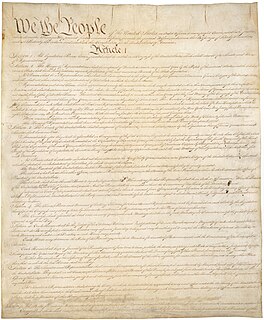
The Constitution of the United States is the supreme law of the United States of America. This founding document, originally comprising seven articles, delineates the national frame of government. Its first three articles embody the doctrine of the separation of powers, whereby the federal government is divided into three branches: the legislative, consisting of the bicameral Congress ; the executive, consisting of the president and subordinate officers ; and the judicial, consisting of the Supreme Court and other federal courts. Article IV, Article V and Article VI embody concepts of federalism, describing the rights and responsibilities of state governments, the states in relationship to the federal government, and the shared process of constitutional amendment. Article VII establishes the procedure subsequently used by the 13 States to ratify it. It is regarded as the oldest written and codified national constitution in force.

Article Five of the United States Constitution describes the process whereby the Constitution, the nation's frame of government, may be altered. Under Article V, the process to alter the Constitution consists of proposing an amendment or amendments, and subsequent ratification.

A constitutional convention is a gathering for the purpose of writing a new constitution or revising an existing constitution. Members of a constitutional convention are often, though not necessarily or entirely, elected by popular vote. However, a wholly popularly-elected constitutional convention can also be referred to as a constituent assembly.

The Hague Conventions of 1899 and 1907 are a series of international treaties and declarations negotiated at two international peace conferences at The Hague in the Netherlands. Along with the Geneva Conventions, the Hague Conventions were among the first formal statements of the laws of war and war crimes in the body of secular international law. A third conference was planned for 1914 and later rescheduled for 1915, but it did not take place because of the start of World War I.
In Canadian politics, a leadership convention is held by a political party when the party needs to choose a leader due to a vacancy or a challenge to the incumbent leader.
The Montreal Convention is a multilateral treaty adopted by a diplomatic meeting of ICAO member states in 1999. It amended important provisions of the Warsaw Convention's regime concerning compensation for the victims of air disasters. The Convention attempts to re-establish uniformity and predictability of rules relating to the international carriage of passengers, baggage and cargo. Whilst maintaining the core provisions which have served the international air transport community for several decades, the new treaty achieves modernization in a number of key areas. It protects passengers by introducing a two-tier liability system that eliminates the previous requirement of proving willful neglect by the air carrier to obtain more than US$75,000 in damages, which should eliminate or reduce protracted litigation.
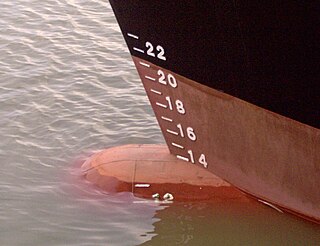
Deadweight tonnage or tons deadweight (DWT) is a measure of how much weight a ship can carry. It is the sum of the weights of cargo, fuel, fresh water, ballast water, provisions, passengers, and crew.

An International Driving Permit (IDP), often referred to as an international driving licence, is a translation of a domestic driving licence that allows the holder to drive a private motor vehicle in any country or jurisdiction that recognises the document. The term International Driving Permit was first mentioned in the document prescribed in the International Convention relative to Motor Traffic that was signed at Paris in 1926, and is a translation of the French 'permis de conduire international', or 'international driving licence'. The Paris treaty, and all subsequent, use the word 'permit' exclusively in relation to all kinds of driving licence.
The Constitution of the State of Alaska was ratified on April 4, 1956 and took effect with Alaska's admission to the United States as a U.S. state on January 3, 1959.
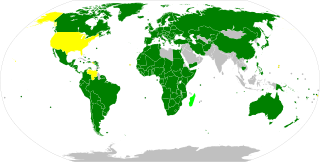
The Protocol Relating to the Status of Refugees is a key treaty in international refugee law. It entered into force on 4 October 1967, and 146 countries are parties.
The Constitution of American Samoa is the constitution that defines the government of American Samoa. Unlike constitutions of a state, it is subject to unilateral change by the federal government. Constitutional documents of the territory include the treaties that created it and the 1960 constitution approved by the federal government and popular referendum.

The Convention on International Liability for Damage Caused by Space Objects, also known as the Space Liability Convention, is a treaty from 1972 that expands on the liability rules created in the Outer Space Treaty of 1967. In 1978, the crash of the nuclear-powered Soviet satellite Kosmos 954 in Canadian territory led to the only claim filed under the convention.

The Convention on Road Traffic, commonly known as the Geneva Convention on Road Traffic, is an international treaty promoting the development and safety of international road traffic by establishing certain uniform rules among the contracting parties. The convention addresses minimum mechanical and safety equipment needed to be on board and defines an identification mark to identify the origin of the vehicle. The Convention was prepared and opened for signature by the United Nations Conference on Road and Motor Transport held at Geneva from 23 August to 19 September 1949. It came into force on 26 March 1952. This conference also produced the Protocol on Road Signs and Signals.
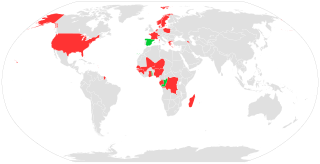
The "Rotterdam Rules" is a treaty proposing new international rules to revise the legal framework for maritime affreightment and carriage of goods by sea. The Rules primarily address the legal relationship between carriers and cargo-owners.

The Maritime Labour Convention (MLC) is an International Labour Organization convention, number 186, established in 2006 as the fourth pillar of international maritime law and embodies "all up-to-date standards of existing international maritime labour Conventions and Recommendations, as well as the fundamental principles to be found in other international labour Conventions". The other "pillars are the SOLAS, STCW and MARPOL. The treaties applies to all ships entering the harbours of parties to the treaty, as well as to all ships flying the flag of state party.
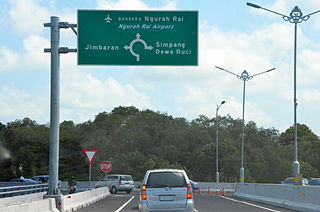
Road signs in Indonesia are standarized road signs similar to those used in other nations but with certain distinctions. As a former Dutch colony, until the 1970s road signs in Indonesia closely followed The Netherlands rules on road signs. Nowadays, Indonesian road sign design are a mix of European, US MUTCD, New Zealand, and Japanese road sign features. According to the 2014 Minister of Transport's Regulation No. 13 concerning Traffic Signs, the official typeface for road signs in Indonesia is Clearview. Indonesia formerly used FHWA Series fonts as the designated typeface though the rules are not being implemented properly.

Road signs in Cambodia are standardized road signs similar to those used in other nations but with certain differences.

Laos traffic signs use Lao, the national language of Laos. However, English is also used for stop and important public places such as tourist attractions, airports, railway stations, and immigration checkpoints. Both Lao and English are used on directional signage.
The Philippine Constitutional Convention of 1971 was called to change the 1935 Constitution of the Philippines. The delegates were elected on November 10, 1970, and the convention itself was convened on June 1, 1971. It was marked by controversies, including efforts to uphold term limits for incumbent President Ferdinand Marcos, and a bribery scandal in which 14 people, including First Lady Imelda Marcos, were accused of bribing delegates to favor the Marcoses.
The right to sit refers to laws or policies granting workers the right to be granted suitable seating at the workplace. Jurisdictions that have enshrined "right to sit" laws or policies include the United Kingdom, Jamaica, South Africa, Tanzania, Uganda, Lesotho, Malaysia, Brazil, Israel, Ireland, the Indian states of Tamil Nadu and Kerala, the Canadian province of Newfoundland and Labrador, and the British overseas territory of Gibraltar and Montserrat. Almost all states of the United States and Australia, as well as the majority of Canadian provinces passed right to sit legislation for women workers between 1881 and 1917. US states with current right to sit legislation include California, Florida, Massachusetts, Montana, New Jersey, New Mexico, New York, Oregon, Pennsylvania, West Virginia, and Wisconsin. A right to sit provision is included in the International Labour Organization's Hygiene Convention, 1964; the convention being ratified by 51 countries as of 2014. Local jurisdictions with right to sit laws include Portland, Oregon, St. Louis, Missouri and London's Royal Borough of Kensington and Chelsea. Some jurisdictions, such as Alabama, Arkansas, Connecticut, Idaho, Kentucky, Maine, Michigan, Missouri, Nevada, New Hampshire, Quebec, and Washington, D.C. have revoked their right to sit laws. Many right to sit laws originally contained gendered language specifying women workers only. Some jurisdictions maintain gendered laws, but many jurisdictions have amended their right to sit laws to be gender neutral.